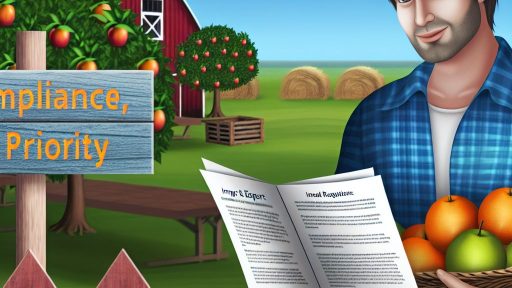Overview of Food Safety Certification and Its Importance for Farmers
Food safety certification plays a crucial role in modern agriculture.
It ensures that farmers adhere to established safety standards.
Moreover, certification builds consumer trust in food products.
When farmers gain certification, they demonstrate commitment to quality.
Consumers are increasingly concerned about food safety issues.
As a result, certified products often enjoy a competitive advantage.
Certification can lead to better market access and higher prices.
Understanding Food Safety Standards
Food safety standards are guidelines that help prevent foodborne illnesses.
These standards cover various aspects of food production.
They include hygiene practices, handling, and storage requirements.
Additionally, specific regulations may vary by region or country.
Farmers must stay informed about applicable regulations.
The Benefits of Certification
Certified farmers enjoy several immediate benefits.
- Improved marketability of their products.
- Increased consumer trust and loyalty.
- Access to premium markets and higher profit margins.
Furthermore, certification can enhance a farm’s reputation.
It acts as a differentiator in a crowded marketplace.
Transform Your Agribusiness
Unlock your farm's potential with expert advice tailored to your needs. Get actionable steps that drive real results.
Get StartedNavigating the Certification Process
The path to certification can seem daunting for some farmers.
However, understanding the process simplifies it significantly.
Initially, farmers should identify the relevant certification bodies.
Next, they must assess current practices against certification standards.
Compliance typically involves training and possibly updates to operations.
Farmers may also consider seeking assistance from consultants.
Maintaining Certification
After receiving certification, farmers must maintain compliance.
Regular audits are often part of the certification agreement.
Farmers should keep detailed records to streamline this process.
Consistent training for staff is also essential for ongoing success.
Continual improvement fosters both safety and operational efficiency.
Key Regulatory Bodies Involved in Food Safety Certifications
Introduction to Food Safety Regulation
Food safety is essential for public health.
It ensures that food products are safe for consumption.
Regulatory bodies play a crucial role in enforcing safety standards.
U.S. Food and Drug Administration (FDA)
The FDA oversees food safety for most food products in the United States.
It establishes regulations that farmers must follow.
Additionally, the FDA collaborates with local entities for compliance.
Farmers must stay informed about FDA guidelines to avoid penalties.
United States Department of Agriculture (USDA)
The USDA primarily focuses on meat, poultry, and egg products.
It ensures these products meet safety standards before reaching consumers.
Farmers working with these products must adhere to USDA inspections.
Compliance helps ensure product quality and consumer safety.
Environmental Protection Agency (EPA)
The EPA regulates the use of pesticides in agriculture.
Proper pesticide management is vital for food safety.
Showcase Your Farming Business
Publish your professional farming services profile on our blog for a one-time fee of $200 and reach a dedicated audience of farmers and agribusiness owners.
Publish Your ProfileFarmers must follow EPA guidelines to minimize chemical residues.
This compliance protects both consumers and the environment.
State and Local Health Departments
State and local health departments also enforce food safety regulations.
These agencies work to implement health codes specific to regions.
Farmers should regularly check for updates on local requirements.
Collaboration with these departments ensures community safety.
Accredited Certification Organizations
Various organizations offer food safety certifications to farmers.
These certifications can include Hazard Analysis Critical Control Point (HACCP) and Global Food Safety Initiative (GFSI).
Obtaining certification enhances marketability and consumer trust.
Farmers should research accredited organizations to find the right fit.
Importance of Compliance
Staying compliant with food safety regulations is critical.
Non-compliance can lead to foodborne illnesses and outbreaks.
These incidents may result in severe penalties for farmers.
Thus, understanding applicable regulations is necessary for successful farming.
Step-by-Step Process for Achieving Food Safety Certification
Understanding Food Safety Certification
Food safety certification ensures that farms adhere to industry standards.
This certification assures consumers about the safety of food products.
Furthermore, it enhances market access for farmers.
Identifying Relevant Standards and Guidelines
The first step involves identifying the appropriate certification standards.
Farmers should consider guidelines from organizations like the USDA or FDA.
Each region may have its own specific requirements.
Conducting a Self-Assessment
Next, conduct a thorough self-assessment of current practices.
Assessments help identify gaps in compliance with food safety standards.
Utilizing checklists often simplifies this process.
Implementing Required Changes
After the assessment, implement necessary changes to farm operations.
Enhancements may include improving sanitation and training staff.
Additionally, farmers should invest in proper storage solutions.
Developing Documentation and Records
Proper documentation is crucial for certification.
Farmers should maintain records of all operations and safety practices.
Regularly updated logs demonstrate compliance during audits.
Choosing a Certification Body
Select a reputable certification body to conduct the audit.
Research various organizations to find one that suits your needs.
Contact them to understand their certification process.
Preparing for the Certification Audit
Preparation is key before the audit takes place.
Farmers should review all documentation and staff training records.
Additionally, ensure all food safety protocols are followed daily.
Successfully Completing the Audit
During the audit, cooperate fully with the auditors.
Answer their questions honestly and provide required documentation.
Afterward, address any issues they may identify.
Receiving Certification and Next Steps
Upon successful completion, you will receive your certification.
Once certified, maintain compliance with food safety practices.
Showcase Your Farming Business
Publish your professional farming services profile on our blog for a one-time fee of $200 and reach a dedicated audience of farmers and agribusiness owners.
Publish Your ProfilePeriodically review and update your processes as needed.
Gain More Insights: Maximizing Farm Potential Through Effective Rural Development Policies
Common Food Safety Standards and Their Requirements
Overview of Food Safety Standards
Food safety standards ensure products are safe for consumers.
These standards evolve to reflect new research and practices.
Farmers must stay informed about relevant certifications.
Compliance with standards can enhance market access.
Global Food Safety Initiative
The Global Food Safety Initiative (GFSI) sets industry benchmarks.
It includes various recognized schemes for certification.
These schemes help farmers build consumer trust.
They promote continuous improvement in food safety practices.
HACCP Principles
The Hazard Analysis and Critical Control Points (HACCP) system identifies hazards.
It consists of seven key principles.
Farmers must conduct a hazard analysis to comply.
Establishing critical control points is essential for pathogen control.
Monitoring methods ensure process integrity.
USDA Organic Certification
USDA Organic Certification requires adherence to specific practices.
Farmers must avoid synthetic fertilizers and pesticides.
This certification promotes environmentally sustainable practices.
Additionally, it assures consumers of food integrity.
ISO 22000 Standards
ISO 22000 is an international standard for food safety management.
It integrates management and the food safety chain.
Farmers must implement a food safety management system.
Moreover, regular audits help maintain compliance with ISO standards.
Safe Quality Food Program
The Safe Quality Food (SQF) program focuses on food safety and quality.
This certification is widely recognized across the supply chain.
Farmers benefit from enhanced brand recognition and market access.
Continuous improvement is a core component of the SQF program.
Key Benefits of Certification
Food safety certification fosters consumer confidence.
It differentiates products in a competitive market.
Certain certifications can open up new markets.
Furthermore, compliance reduces the risk of foodborne illnesses.
Preparing for Certification
Farmers should start by understanding the specific requirements.
Conducting an internal audit can identify gaps.
Training staff on food safety practices is crucial for success.
Documenting processes supports compliance efforts.
Delve into the Subject: Integrating Food Safety Standards into Farm Operations
Training Programs and Resources Available for Farmers
Overview of Training Programs
Various training programs exist to support farmers’ food safety certification.
These programs cover essential safety practices and regulations.
Moreover, they offer both theoretical knowledge and practical skills.
Government-Provided Resources
Local and national governments provide valuable resources for food safety training.
Showcase Your Farming Business
Publish your professional farming services profile on our blog for a one-time fee of $200 and reach a dedicated audience of farmers and agribusiness owners.
Publish Your ProfileThe USDA offers workshops and online courses tailored to farmers’ needs.
Additionally, state departments of agriculture frequently organize training events.
Collaboration with Agricultural Organizations
Farmers can benefit from partnerships with agricultural organizations.
The National Farmers Union provides information on food safety standards.
Moreover, the Cooperative Extension System offers educational programs.
Online Training Options
Online training modules are increasingly popular among farmers.
They allow participants to learn at their own pace.
Many universities offer accessible online courses on food safety.
Certification Programs Offered
Certification programs validate farmers’ understanding of food safety practices.
Various organizations provide certification in safe food handling.
Moreover, some certifications focus specifically on organic produce.
Workshops and Hands-On Training
Hands-on workshops allow farmers to apply food safety practices in real scenarios.
These interactive sessions encourage practical learning and discussion.
Furthermore, they provide networking opportunities among farmers.
Continuing Education and Updates
Farmers should engage in continuing education for food safety compliance.
Regular updates on the latest regulations are crucial.
Many organizations send newsletters with current trends and changes.
Local Community Support
Local agricultural extension agents can provide personalized assistance.
They help farmers understand specific regulations and local resources.
Additionally, local farming groups often hold events to share best practices.
Explore Further: Climate Laws and Their Effects on Farming Operations

Benefits of Food Safety Certification for Farmers and Consumers
Enhanced Consumer Trust
Food safety certification boosts consumer confidence in agricultural products.
It assures customers that items meet quality and safety standards.
When consumers trust the products, they are more likely to purchase them.
Access to New Markets
Certification opens doors to new markets, expanding business opportunities.
Farmers can supply their goods to grocery stores and restaurants seeking certified products.
Moreover, certified farmers often enjoy better pricing for their products.
Improved Production Practices
Certification requires farmers to adopt improved production techniques.
This requirement leads to better overall farm management practices.
As a result, the quality of crops and livestock enhances significantly.
Compliance with Regulations
Food safety certification helps farmers comply with local and international regulations.
Staying compliant reduces the risk of penalties and fines.
Furthermore, it demonstrates a commitment to food safety practices.
Increased Market Competitiveness
Certified farmers gain a competitive edge in the marketplace.
They can effectively differentiate their products from uncertified ones.
This differentiation often translates to increased market share.
Healthier Communities
Ensuring food safety contributes to healthier communities overall.
It reduces the risk of foodborne illnesses among consumers.
Consequently, certified farmers play an important role in public health.
Potential for Grant Eligibility
Food safety certification can make farmers eligible for government grants.
Showcase Your Farming Business
Publish your professional farming services profile on our blog for a one-time fee of $200 and reach a dedicated audience of farmers and agribusiness owners.
Publish Your ProfileThese grants can support further improvements on the farm.
Additionally, funding helps farmers invest in equipment and technology.
Gain More Insights: Legal Implications Of Pesticide Misuse In Farming
Challenges Farmers Face in the Certification Process
Understanding Complexity and Costs
Farmers often struggle with the complexity of food safety regulations.
Various standards exist depending on the type of certification required.
These complexities can overwhelm farmers with limited resources.
Additionally, the costs associated with obtaining certification can be prohibitive.
Farmers may face expenses for training, equipment, and audits.
Many small-scale farmers find these costs difficult to manage.
Time Constraints
Time is another significant challenge in the certification process.
Farmers must balance certification efforts with daily operational duties.
This juggling act may lead to delays in completing necessary documentation.
Moreover, certification often requires continuous monitoring and updates.
As a result, maintaining compliance can strain farmers’ schedules.
Lack of Support and Resources
Many farmers lack access to relevant support services.
Assistance programs for navigating certification can be hard to find.
Without proper guidance, farmers may misinterpret the requirements.
This misunderstanding can lead to improper documentation and failures.
Furthermore, inadequate financial resources can hinder overall progress.
Changing Regulations
The landscape of food safety is constantly evolving.
Farmers must stay updated on any changes to regulations.
These updates can create confusion and uncertainty in the certification process.
Moreover, frequent changes may require farmers to adjust methods often.
This can lead to frustration and increased efforts to maintain compliance.
Building Trust with Consumers
Ultimately, consumers expect high food safety standards.
Certified farmers must build and maintain this trust through transparency.
This commitment can further add to the pressures they face.
Farmers strive to demonstrate their compliance but face skepticism at times.
Establishing strong consumer trust is essential for their market success.
Maintaining Compliance and Preparing for Regular Audits
Understanding Compliance Regulations
Farmers must stay informed about food safety regulations.
Each regulation plays a vital role in ensuring safety standards.
Regular training helps staff understand these compliance requirements.
Utilizing checklists can streamline adherence to these regulations.
Documenting Processes and Procedures
Farmers should maintain detailed records of all procedures.
Documentation should include source verification and food handling best practices.
Electronic systems can aid in organizing this information efficiently.
Consistent documentation simplifies the audit process significantly.
Conducting Internal Audits
Regular internal audits help identify potential areas for improvement.
Conduct audits quarterly to stay on top of compliance status.
An effective audit should assess all areas of operations.
Showcase Your Farming Business
Publish your professional farming services profile on our blog for a one-time fee of $200 and reach a dedicated audience of farmers and agribusiness owners.
Publish Your ProfileEngaging employees fosters a culture of accountability and safety.
Preparing for External Audits
Preparation for external audits begins weeks in advance.
Farmers should gather all relevant documentation beforehand.
Training sessions can align staff expectations with audit requirements.
Simulating an audit can highlight any potential gaps.
Communicating with Auditors
Establish clear communication with auditors from the beginning.
Ensure that all staff understand their roles during the audit.
Transparency fosters trust and eases the evaluation process.
Providing accurate and timely information is crucial.
Continuous Improvement Practices
Continuous improvement should be a core value of operations.
Regularly updating processes based on audit feedback is essential.
Investing in new training programs enhances employee skills.
Farmers can leverage technology to enhance compliance efforts.
Additional Resources
The 2024 Farm Bill: H.R. 8467 Compared with Current Law
Farm to School – Food Safety FAQs | Food and Nutrition Service




